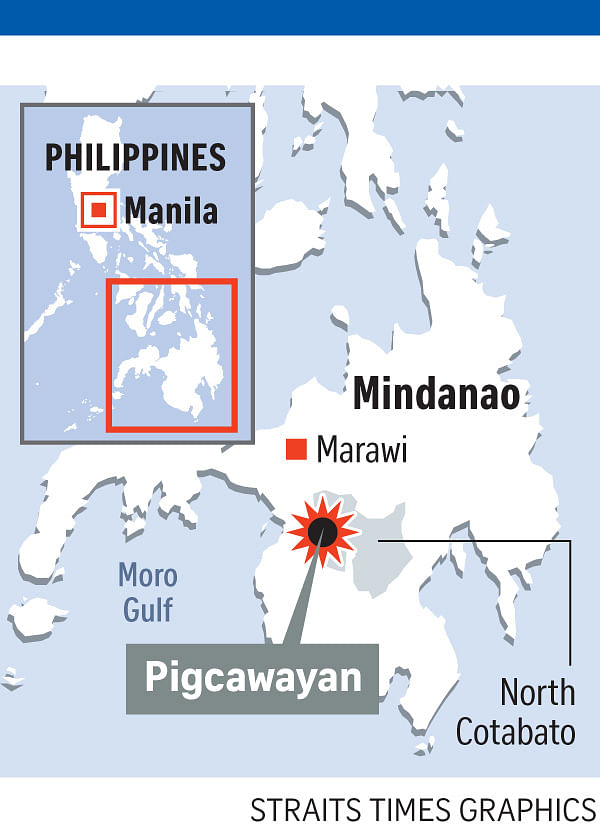Members of a Muslim rebel group stormed a village about 160km south of besieged Marawi City in the Philippines yesterday, attacking a military outpost, taking hostages and occupying a school.
After a day-long gunbattle with troops who surrounded them, the militants fled around sunset, leaving behind 31 hostages they had earlier used as human shields, including 12 children.
While security officials were quick to dismiss the raid as "an opportunistic activity", some analysts see it as the possible opening of a new front by militants, even as government troops remain bogged down in Marawi.
The military dismissed suggestions that the attack may have been intended to help the Marawi militants by distracting the troops.
About 300 gunmen from the Bangsamoro Islamic Freedom Fighters (Biff) stormed Malagakit village, near Pigcawayan town in North Cotabato province, at around 6am, said army brigade spokesman Nap Alcarioto.
They attacked a small militia camp, but were forced to retreat when reinforcements arrived.
About 30 rebels then descended on a nearby school, where they took dozens of people hostage. Reports said they planted improvised bombs around the school to keep soldiers at bay, before fleeing around sunset.
The attack comes amid the growing threat of terrorism in the region. In Indonesia, the police force has been put on high alert ahead of Idul Fitri this weekend over concern about possible terrorist attacks.
In Marawi, a siege that began a month back still has not been repelled. On May 23, about 500 militants stormed the mainly Muslim town in an audacious bid to turn it into a province of the Islamic State in Iraq and Syria (ISIS).
Militants still control some parts of the city, though the military's public affairs chief, Colonel Edgard Arevalo, told reporters that the campaign in Marawi "is already nearing conclusion".
Biff, which is behind the Malagakit attack, is a splinter group of the 12,000-strong Moro Islamic Liberation Front, which has been holding peace talks with the government. In 2014, Biff pledged allegiance to ISIS.
Brigadier-General Restituto Padilla, the military spokesman, called the Biff raid "an opportunistic activity".
Analysts, however, warn that the raid may be a prelude to an escalation of a conflict, sparked by the Marawi siege, that may stretch the military's resources.
"Allegiances on the ground are fluid among these 20-odd armed groups in Mindanao. They could be tied by kinship, ethnicity or religious beliefs. Certainly, you cannot discount the sympathy factor," said Associate Professor Eduardo Araral, vice-dean of the Lee Kuan Yew School of Public Policy.
He added that Christian groups may feel threatened and re-arm. "What we want to avoid is a civil war instigated by ISIS and its supporters," he said.
The resulting instability may inspire similar attacks elsewhere in the region. To address the growing ISIS threat, the Philippines, Indonesia and Malaysia are holding a meeting in Manila today. "We will be talking about enhanced cooperation… and how Asean can play a more major role in preventing the spillover from Iraq and Syria," Philippine Foreign Secretary Alan Cayetano said.


